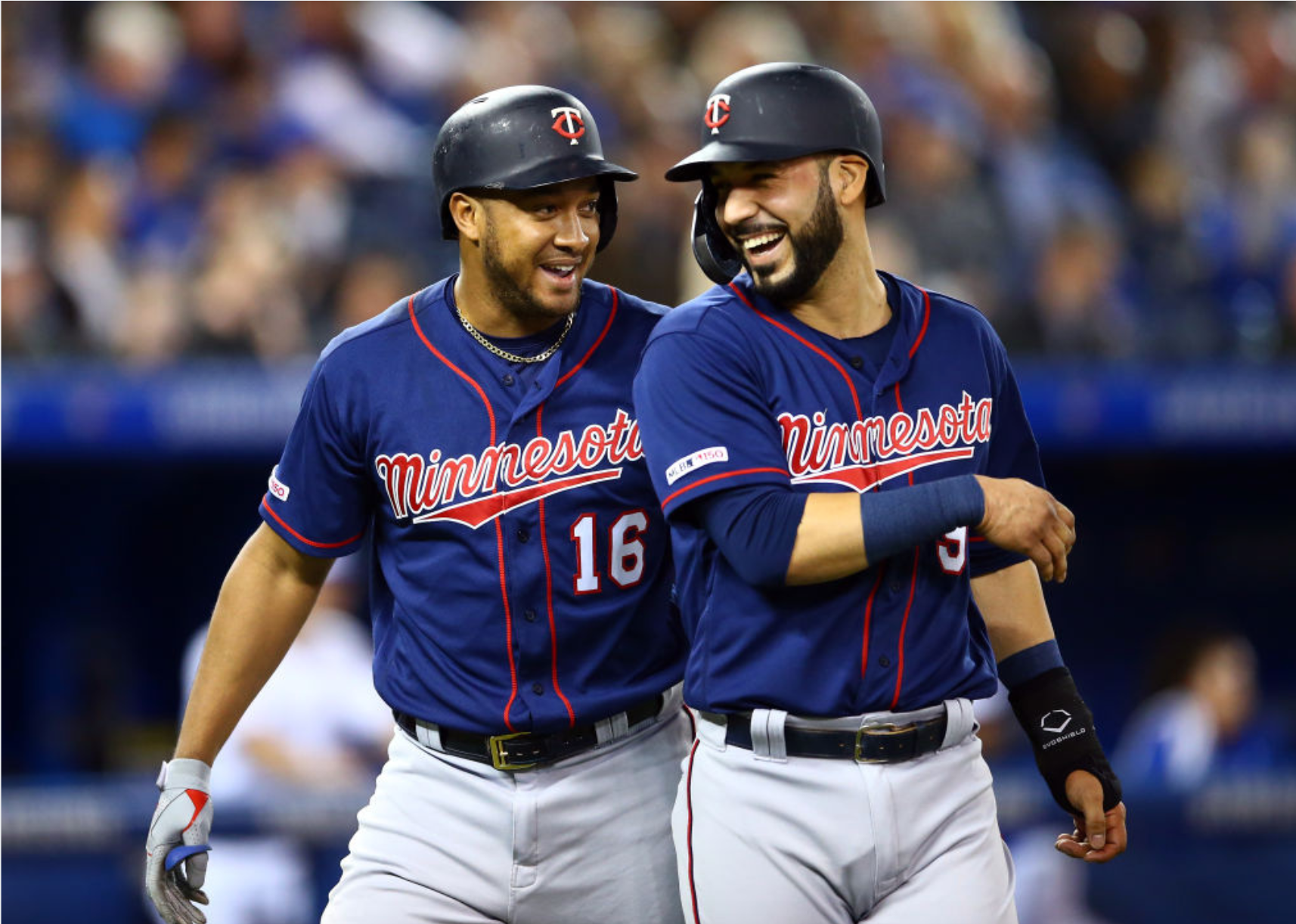
Stories behind every MLB team name
Any baseball fan who has wondered how his or her favorite Major League Baseball team got its name are in for a treat. Stacker took a look at the origin story behind every MLB team name. Some teams can trace their roots back more than 130 years with names like the Cornhuskers, (White Sox), Rustlers (Indians), and Blues (Twins).
Many teams got their nicknames thanks to a name-that-team contest that called on fans to participate. The New York Mets, Arizona Diamondbacks, and Kansas City Royals are three such teams, paying a nod to a symbol of the region.
The Colorado Rockies went against fans' wishes of naming them the Bears. The Rockies were Colorado's failed NHL franchise from 1976–81, and fans didn't want to be reminded of that failure. Financial drives pushed the Marlins to change their surname from Florida to Miami in hopes of securing funding for a new ballpark.
The Yankees actually started out as the Baltimore Orioles. And the Red Sox were once the Americans—the team took the name Red Sox after another franchise in Boston changed its name to the Doves. Speaking of Sox, the White Sox, Red Sox, and Reds (Red Stockings) all shortened their names in order to appease local newspapers, who couldn't fit the word Stockings easily into headlines.
Speaking of newspapers, a reporter in St. Louis overheard a fan say the team wore a lovely shade of cardinal, used it in his column, and the Cardinals were no longer the Perfectos. The Reds even had to change their name back to the Redlegs in the late 1950s to avoid being associated with communism. MLB feared they could defeat the Yankees in the World Series, and the headline "Reds defeat Yankees" could mean a political and cultural snafu.
Read on for the stories behind every MLB team name.
You may also like: Famous baseball players from every state
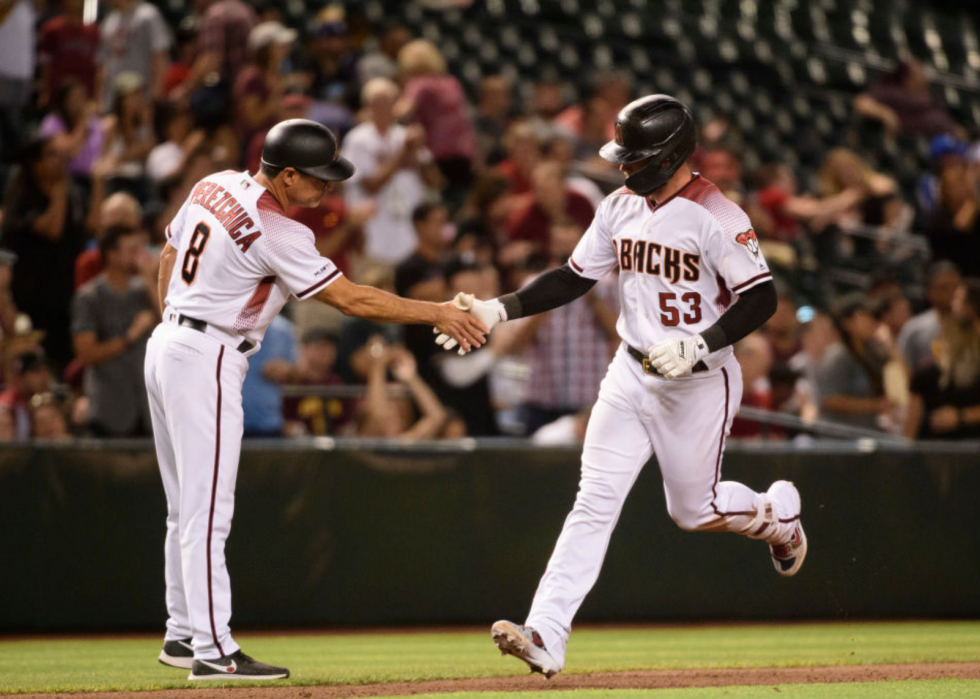
Arizona Diamondbacks
The Diamondbacks, or D-Backs as they're known by fans, were part of a Major League Baseball expansion in 1995, and their name was the result of a "name-the-team" contest. The team's victory over the Yankees in the 2001 World Series was one of the more memorable moments in baseball history, as franchise icon Luis Gonzalez looped a Mariano Rivera pitch into left field for a walk-off single in the bottom of the ninth in Game 7.
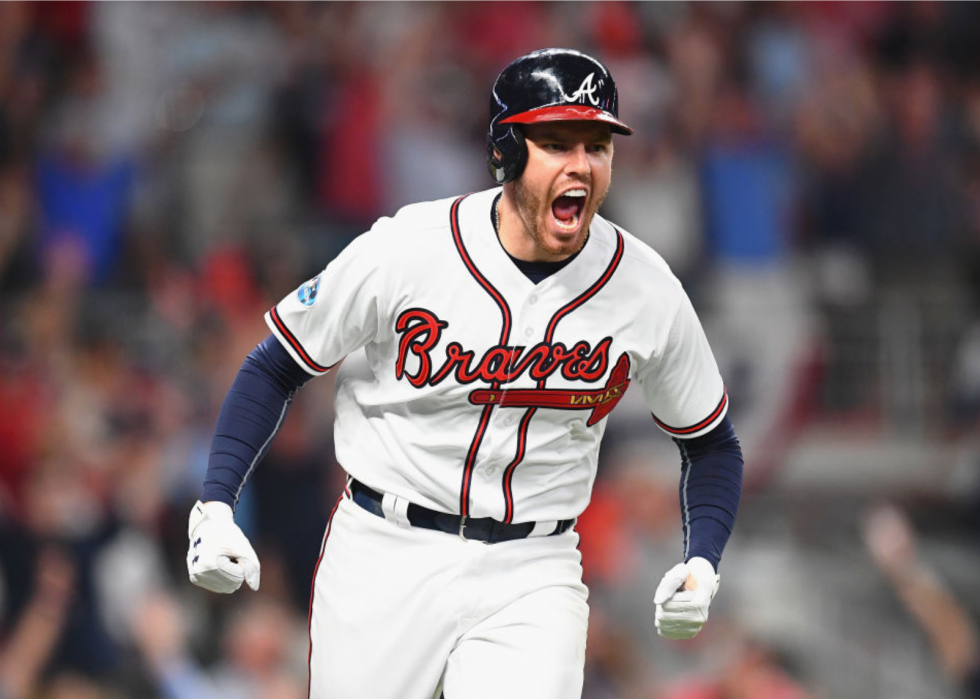
Atlanta Braves
The Atlanta Braves were founded in Boston in 1871 as the Boston Red Stockings, before becoming the Red Caps, Beaneaters, Rustlers, and Doves. James Gaffney purchased the team in 1912 and changed the team's mascot to the Braves, after a Tammany Hall political group he was closely affiliated with. The Braves name has come under some criticism for its use of Native American symbols, leading the team to change its mascot from Homer the Brave to Blooper, and the franchise has discouraged fans from doing the Tomahawk Chop during games.
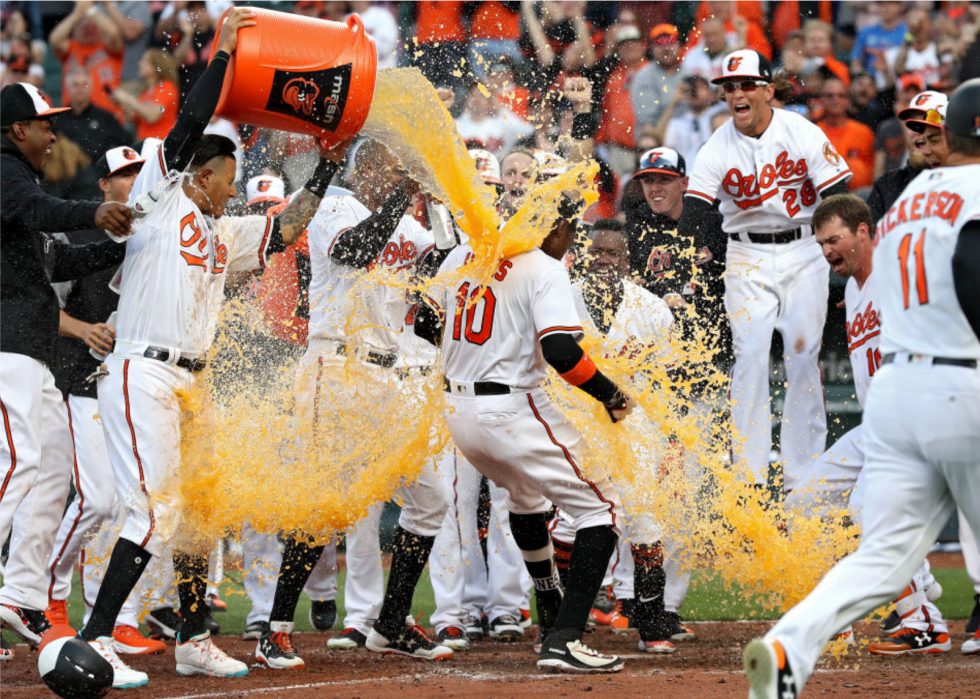
Baltimore Orioles
Following nearly five decades in St. Louis as the Browns, the franchise relocated to Baltimore in 1954. The Oriole nickname comes from the state bird of Maryland and was used by a number of Baltimore's professional sports teams in the late 1800s and early 1900s, including the New York Yankees before they moved to New York City.
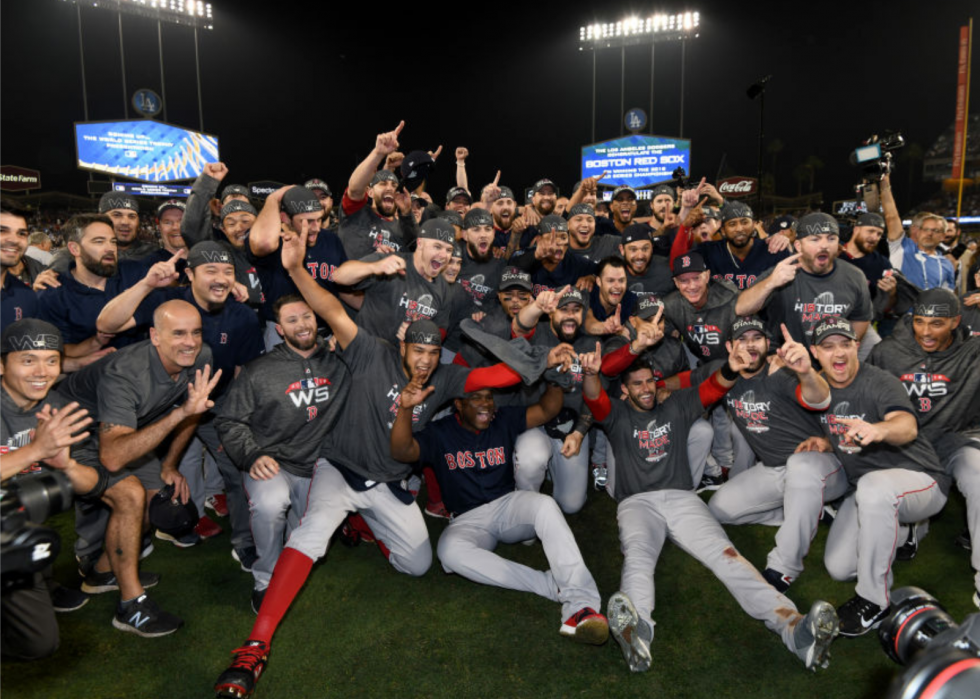
Boston Red Sox
The Red Sox franchise was founded in 1901 as the Boston Americans and won the first World Series in Major League Baseball in 1903. The team adopted the Red Sox moniker in 1908 after the team that would become the Braves changed its name from the Red Stockings to the Doves. The franchise has played at Fenway Park since 1912, capturing nine World Series titles despite an 86-year championship drought from 1918 to 2004.
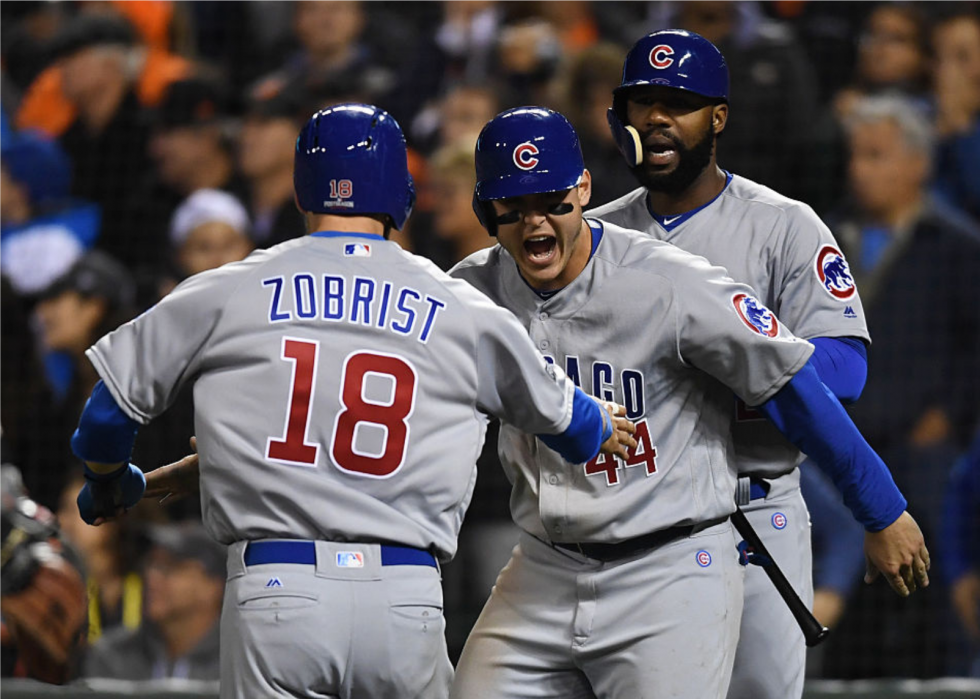
Chicago Cubs
The Cubs' nickname officially came into existence in 1903, stemming from a prevalence of young players on the roster. The franchise began playing in 1870 as the Chicago White Stockings, before becoming the Colts under the leadership of Cap Anson. When Anson was fired in 1897 after 22 years with the franchise, local newspapers began calling them the Orphans. The first reference to the team as the Cubs came in a 1902 Chicago Daily News headline, in which the typesetter mistakenly capitalized the C in Cubs.
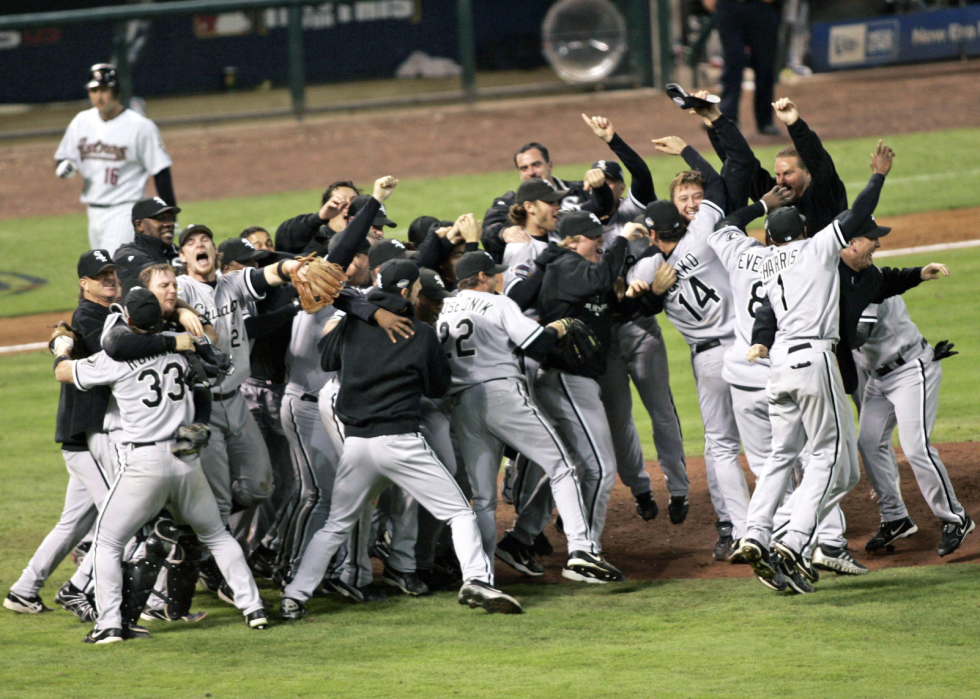
Chicago White Sox
The team that would become the Chicago White Sox started in Iowa as the Sioux City Cornhuskers in 1888. Team owner Charles Comiskey moved the club to St. Paul, Minn. and changed the name to the Saints in 1894. After the team moved to Chicago in 1900, they were known as the White Stockings until 1904 when the name was shortened to White Sox. The change was precipitated by newspapers being unable to fit Stockings easily in a headline.
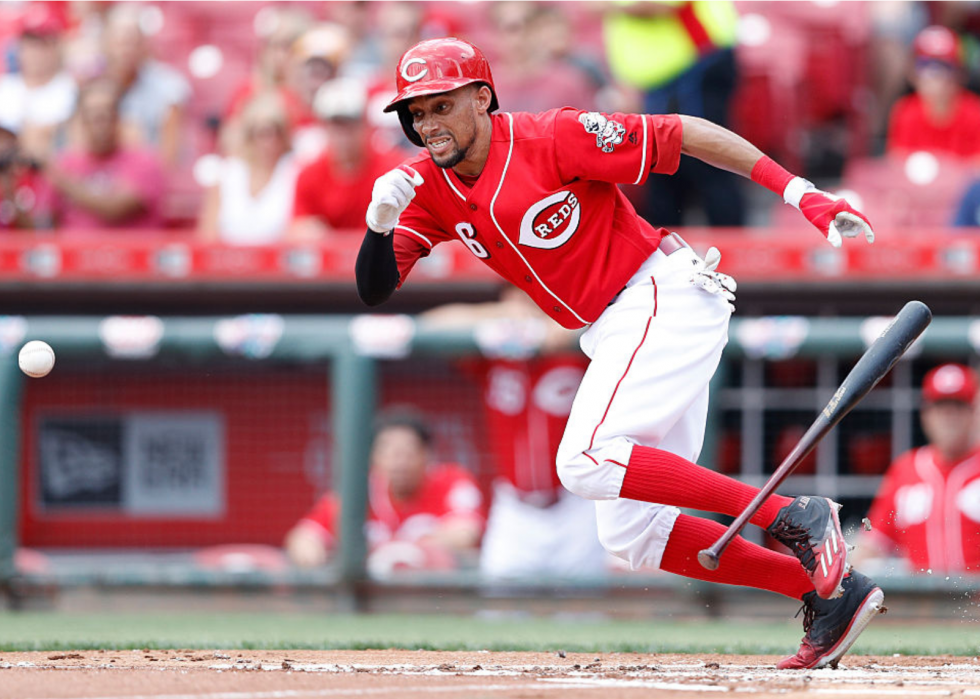
Cincinnati Reds
The Reds were founded in 1882 as the Cincinnati Red Stockings, and are one of only four franchises with both 10,000 wins and losses. The team became known as the Redlegs, which was shortened to Reds in 1890 upon joining the National League. The team returned to the Redlegs moniker from 1954 through 1958. The team did so to avoid being associated with communism during the Red Scare and McCarthyism, removing the word Reds from their uniform altogether.
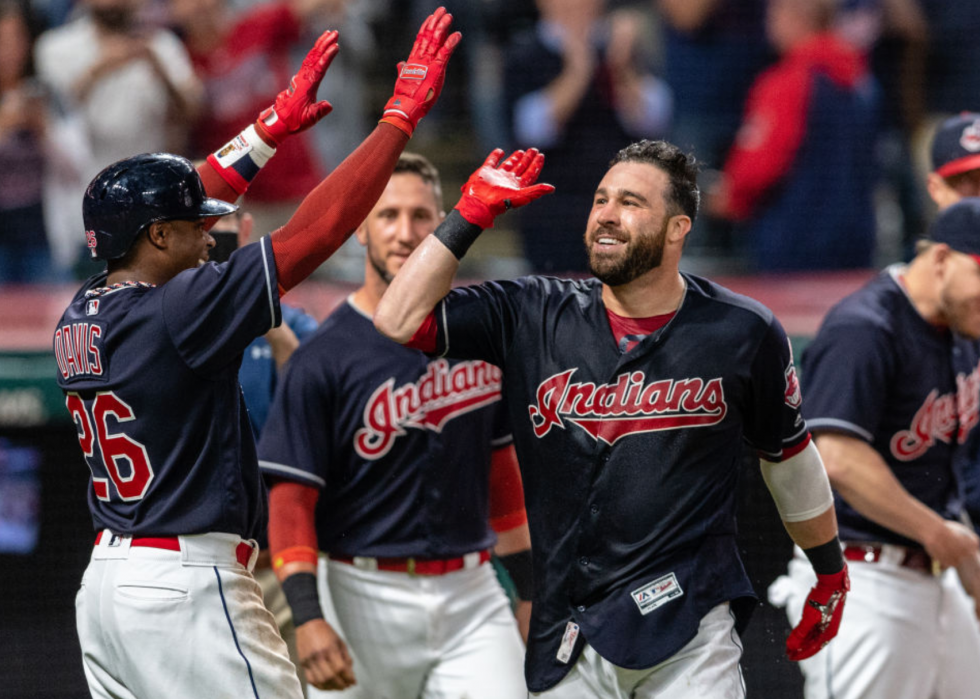
Cleveland Indians
The Cleveland Indians began as the Grand Rapid Rustlers in 1894, moving to Cleveland in 1900 and playing as the Lake Shores, Bluebirds, and Broncos during the century's first three years. The team became the Cleveland Naps in 1903 in homage to their best player, Napoleon Lajoie. Lajoie's exit from Cleveland led to the name Indians being adopted by local sportswriters. The team has come under fire for its usage of the name Indians, as well as its mascot, Chief Wahoo, a caricature of a Native American in a baseball uniform, which MLB removed from the team's uniform and merchandise in 2018.
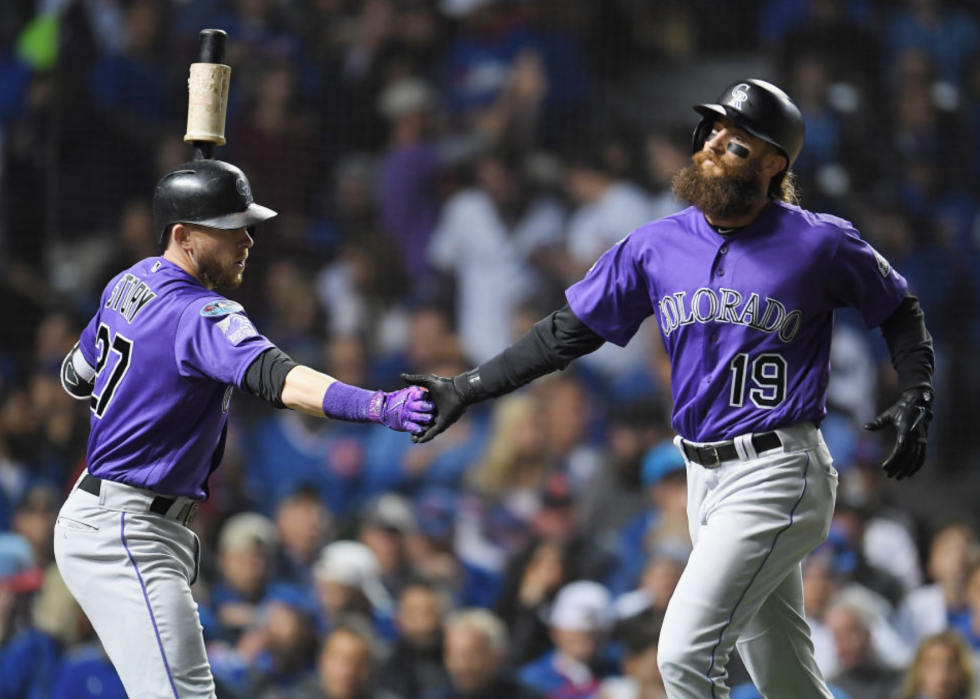
Colorado Rockies
The Colorado Rockies began playing as an expansion team, along with the Florida Marlins, in 1993. The team's name was both a reference to the nearby Rocky Mountains and a failed NHL franchise of the same name that played in Denver from 1976–1982. The Denver Post ran a name-the-team contest, and a large majority of the respondents voted for the team's nickname to be the Bears.

Detroit Tigers
The Detroit Tigers joined Major League Baseball in 1901 as one of the eight original American League teams. They began as a minor league team in 1894, known as the Detroit Wolverines, but were often called the Tigers in reference to the 425th National Guard infantry regiment, one of the oldest military units in Michigan at the time. The team asked for and received permission from the unit to formally adopt the logo and Tiger nickname before the 1901 season.
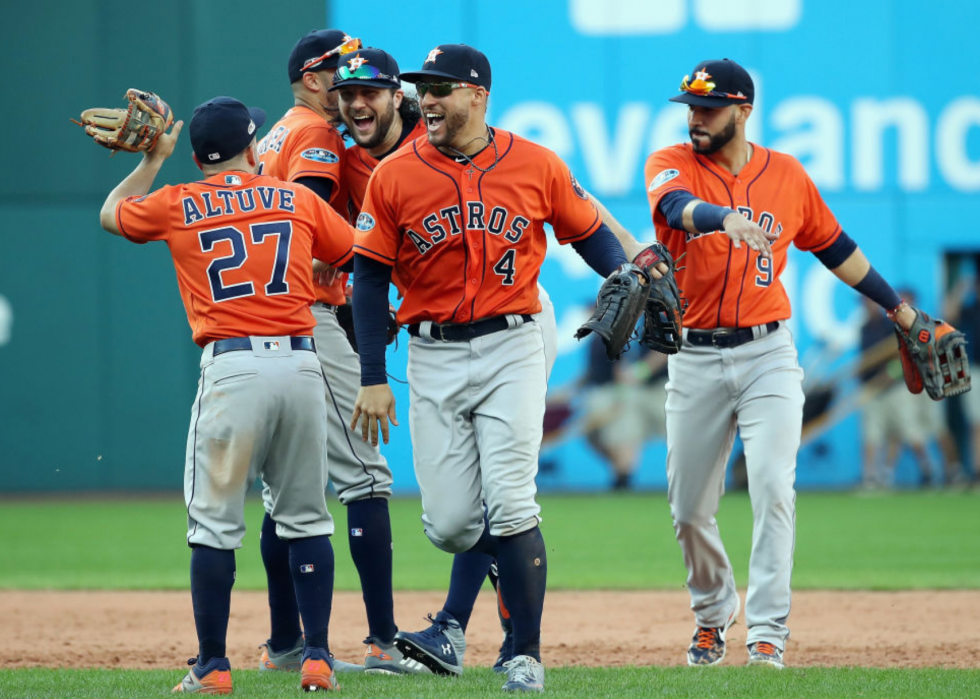
Houston Astros
A National League expansion in 1962 brought the New York Mets and the Houston Colt 45s into Major League Baseball. The Colt 45s nickname was the product of a name-that-team contest and references the popular gun, known as the “gun that won the West.” The team changed its name to the Astros in 1965 in reference to Houston's place in the burgeoning space industry.
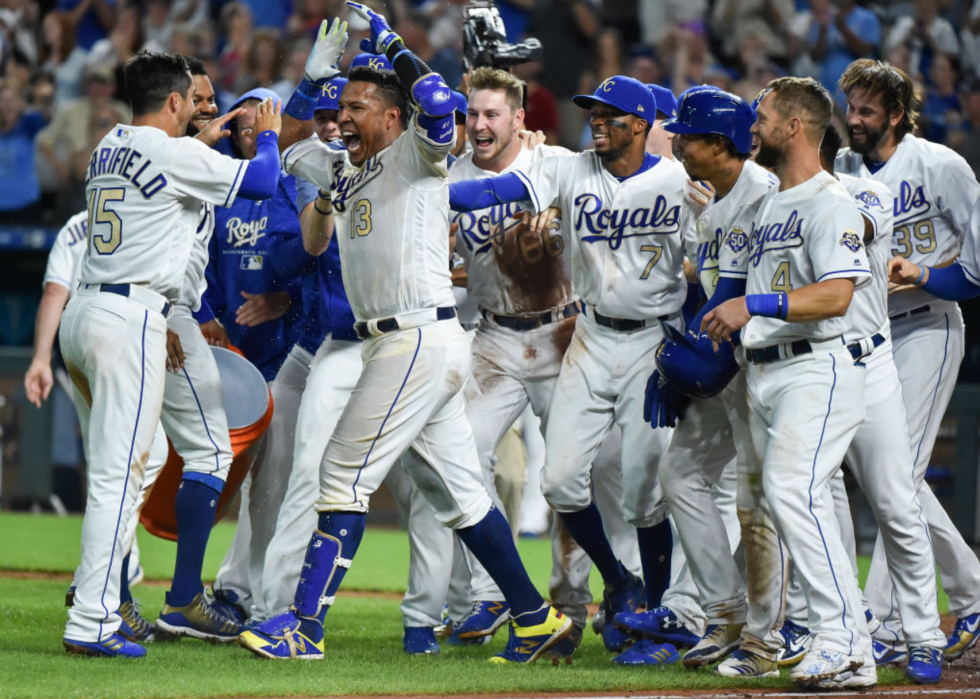
Kansas City Royals
Like many other teams, the Royals nickname was the product of a name-that-team contest held before the franchise joined Major League Baseball in 1969. The city had lost the Athletics to Oakland prior to the 1967 season. The Royals moniker was in reference to the American Royal Livestock and Horse Show, the largest in Missouri's billion-dollar livestock industry.

Los Angeles Angels
The Los Angeles Angels have come full circle with their name since being founded as part of Major League expansion in 1961. While the nickname Angels—a Spanish-to-English translation of Angeles—has not changed, the city and region have. The Angels were known as the California Angels from 1965–1996, the Anaheim Angels from 1997–2004, and the Los Angeles Angels of Anaheim from 2004 until 2016, when they returned to the Los Angeles Angels.
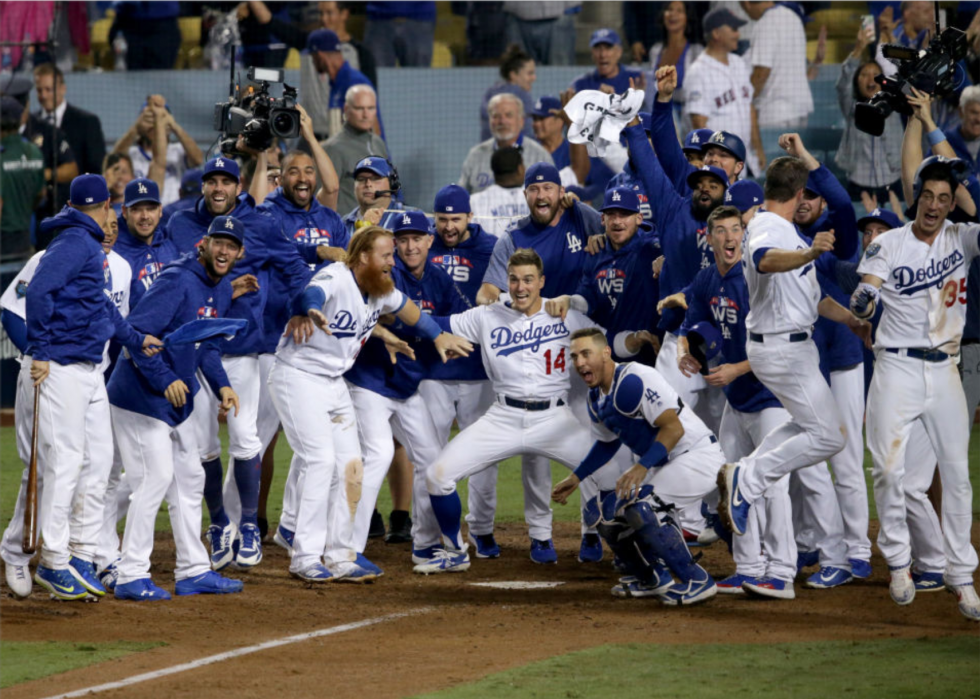
Los Angeles Dodgers
The Dodgers traces its roots back to Brooklyn in 1884, where the team underwent nine name changes before settling on the Dodgers in 1931. Prior to that, the team was known as the Atlantics, Grays, Bridegrooms, Grooms, Bridegrooms again, Superbas, Trolley Dodgers, Superbas again, and the Robins. The name Dodgers stemmed from pedestrians having to dodge trolleys that were built in the streets of Brooklyn in the 1890s.
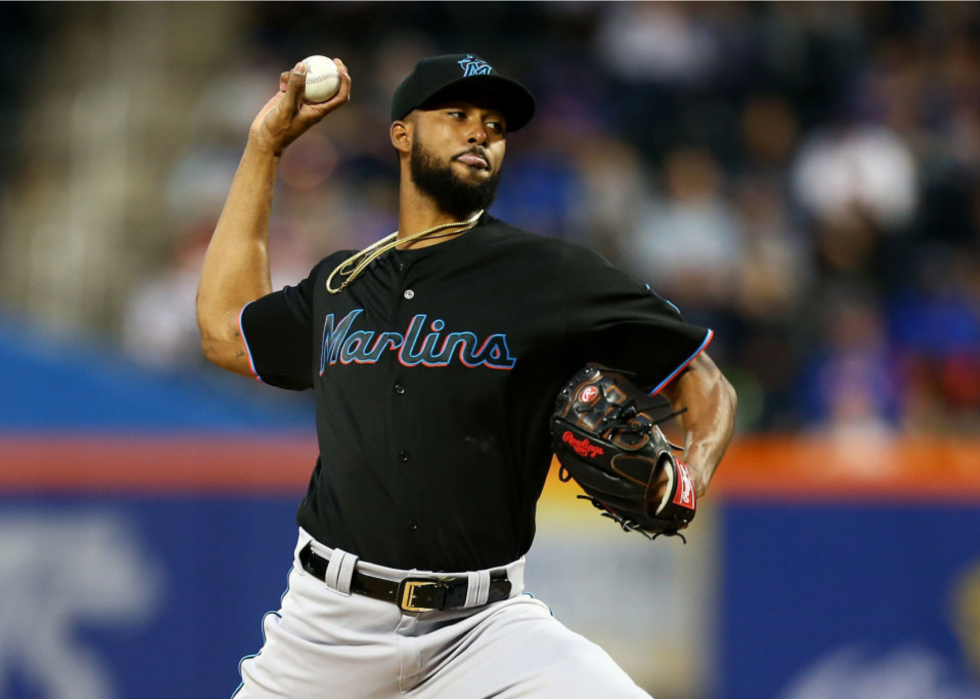
Miami Marlins
The Marlins joined Major League Baseball as the Florida Marlins in 1993, along with the Colorado Rockies. They adopted their name from a minor league team that had played in south Florida, as well as the popular sportfish of the region. In a bid to secure funding to pay for their new ballpark, they incorporated Miami into the team name in 2012.

Milwaukee Brewers
The Seattle Pilots joined MLB in 1969 as part of a four-team expansion, and were bought out of bankruptcy and moved to Milwaukee before the 1970 season by future commissioner Bud Selig. The name Brewers was used by a number of baseball teams in the Milwaukee area in tribute to Wisconsin's beer industry.
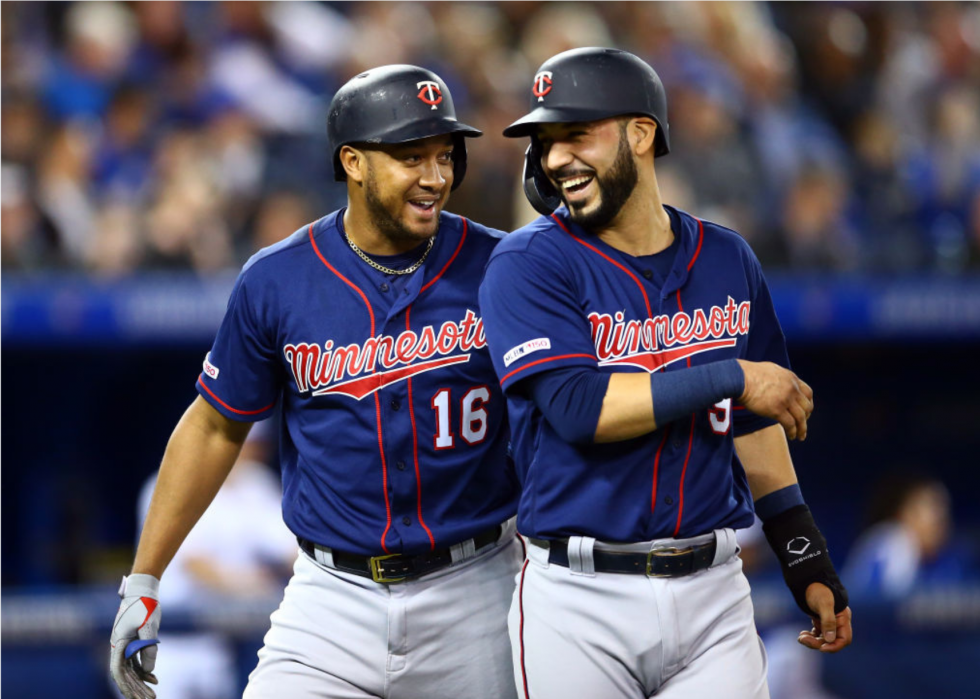
Minnesota Twins
The Twins were founded as the Kansas City Blues in 1894 before joining the new American League in 1901 as the Washington Senators. Upon moving to Minnesota for the 1961 season, the cities of Minneapolis and St. Paul—the Twin Cities—were prepared to stake a claim for the team. In the end, the name Twins, along with a logo depicting two baseball players shaking hands from either side of the Mississippi River, was adopted.
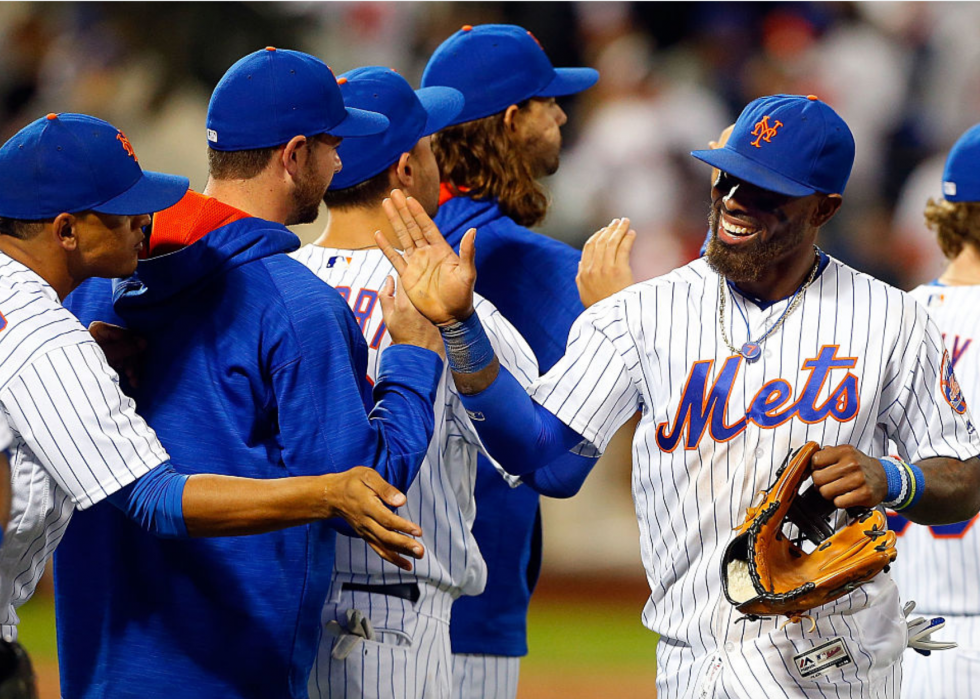
New York Mets
The New York Mets got their name like many others, from a fan contest. The name Mets, short for Metropolitans, was chosen from among 10 finalists and pays tribute to an American Association team from 1880–87 of the same name.
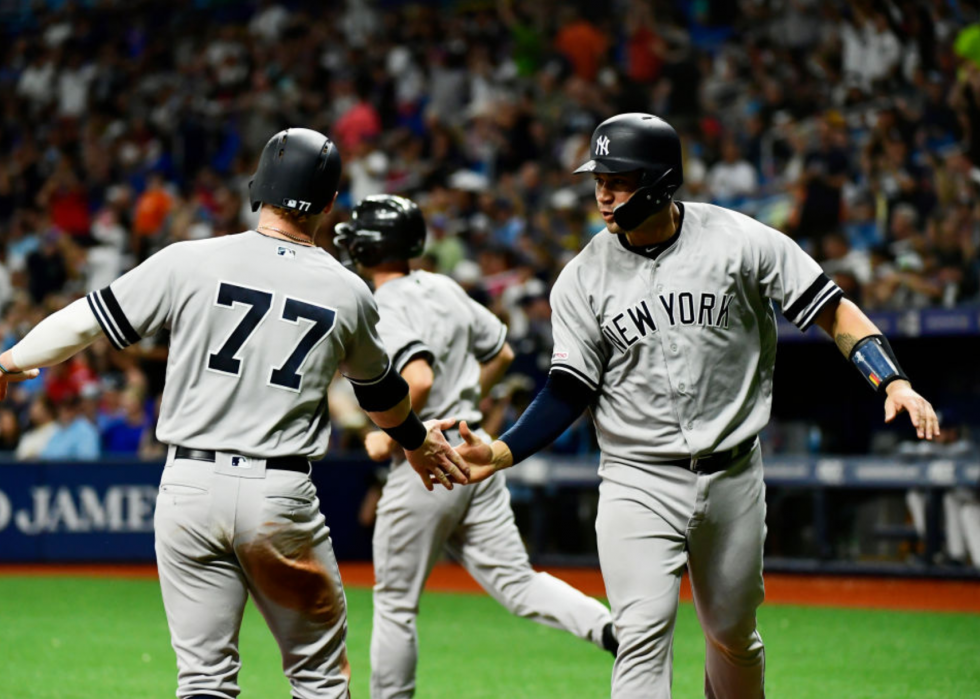
New York Yankees
One of the most valuable teams in all of sports, the Yankees began playing two seasons as the Baltimore Orioles in 1901–02. When MLB owners agreed to allow a second team in New York for the 1903 season, the Orioles moved up I-95 and became the New York Highlanders, a nod to their team president's Scottish heritage. Yanks was used almost immediately by local papers, who couldn't fit Highlanders in a headline, and the name was officially adopted before the 1913 season.
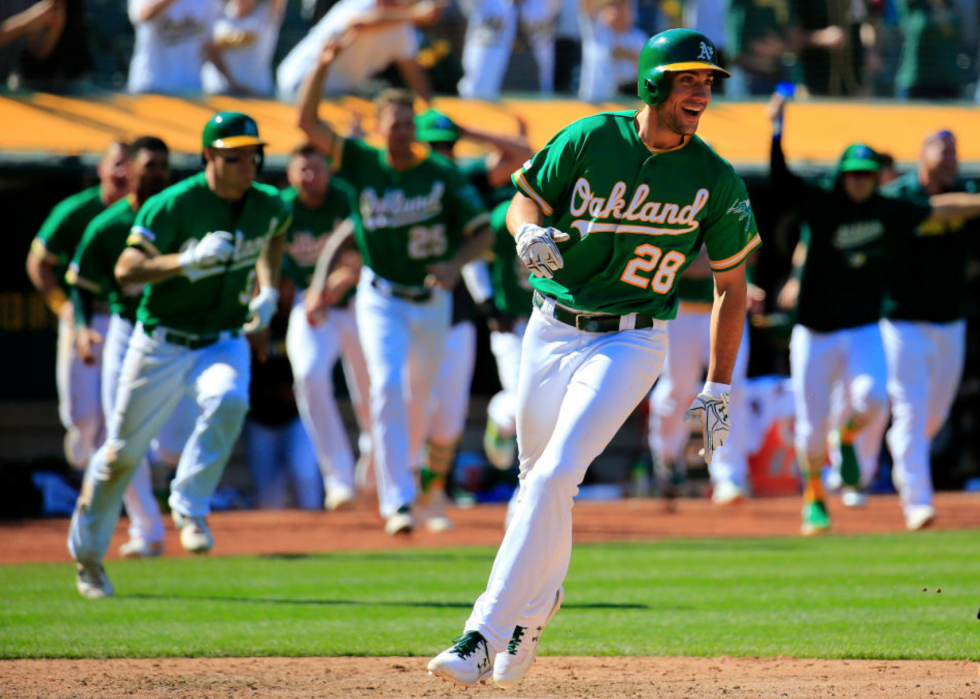
Oakland Athletics
The Athletics' nickname traces back to 1860s Philadelphia, where the team was founded. The Athletic Baseball Club of Philadelphia played in the National Association from 1860-76, before being expelled and disbanded for financial reasons. In 1901, the Philadelphia Athletics were reborn and began play in the National League, before moving to Kansas City from 1955–1967. Upon moving to Oakland for the 1968 season, the team shortened its name to the A's, a nickname often used today despite the team officially returning to the Athletics in 1987.

Philadelphia Phillies
The Philadelphia Quakers were brought in as one of the original eight teams in the National League. The team changed its name to the Philadelphias in 1884, but like in many other cities, local newspapers began to use Phillies in order to fit in headlines. After years of ineptitude, the Phillies held a team re-naming contest in the early 1940s, with Blue Jays being chosen as the winning entry. Though the team wore a Blue Jay patch on their jerseys for a few years, the idea of renaming the team was scrapped by 1950, and the Phillies remained.

Pittsburgh Pirates
Only the Chicago Cubs franchise traces back further than today's Pittsburgh Pirates. The Allegheny, named for the nearby river, began to play as an independent team in 1882 before joining the National League in 1887 and becoming the Pittsburgh Alleghenys. In 1890, when the team signed second baseman Louis Bierbauer away from the Philadelphia Athletics, local papers in Philadelphia described the move as “piratical.” Fans began calling the team the Pirates, and the franchise officially adopted the moniker in 1891.
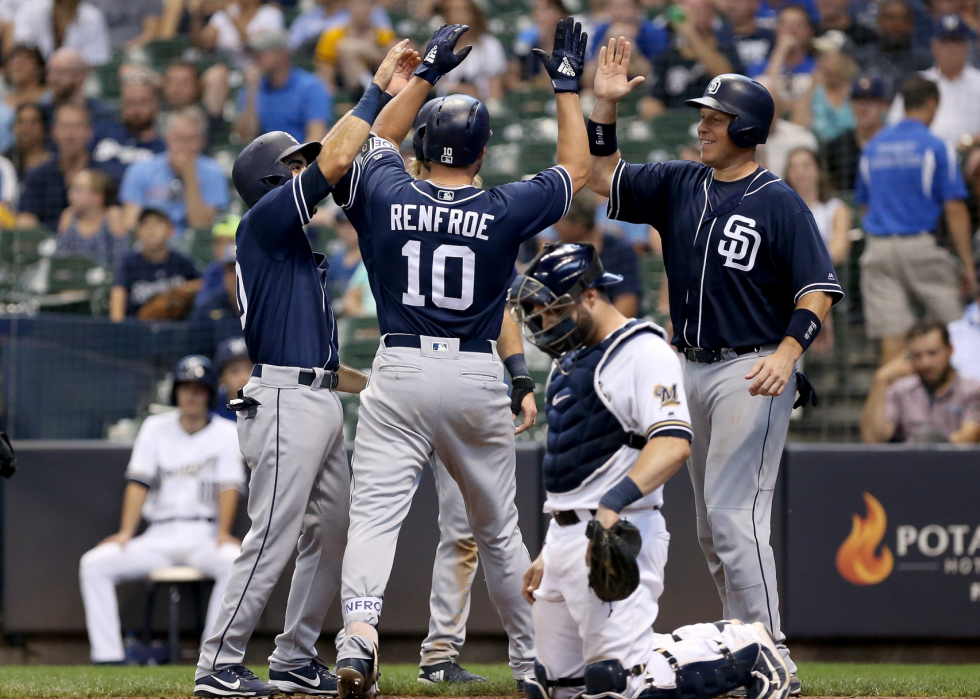
San Diego Padres
The San Diego Padres was one of four teams to join MLB in 1969, deriving the name from a minor league team in the Pacific Coast League. Padre, Spanish for "father," refers to the friars who made San Diego the first Spanish mission in California.
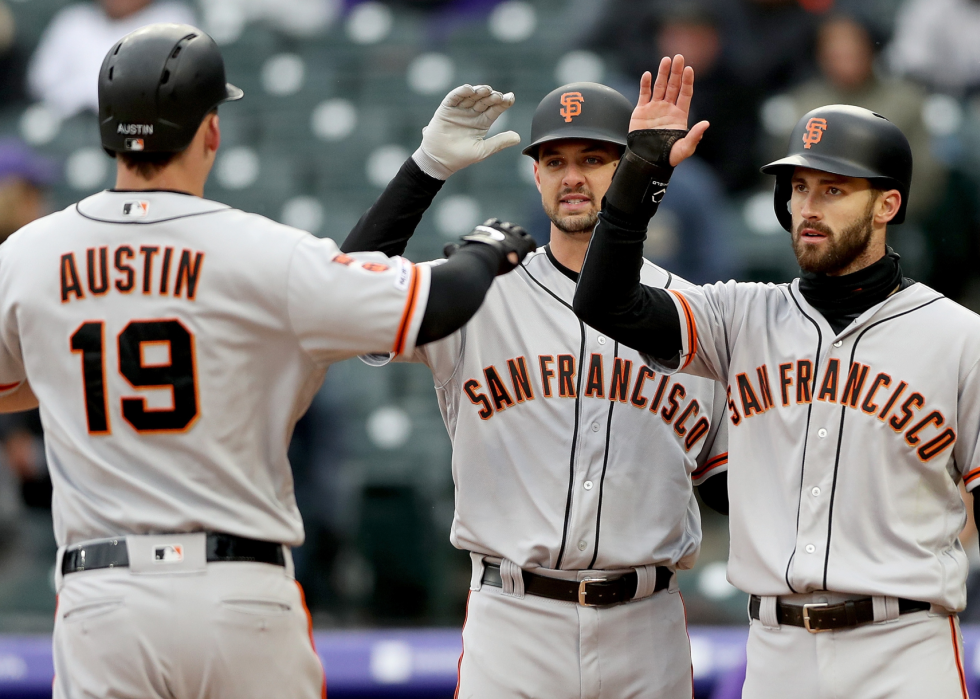
San Francisco Giants
The storied history of the San Francisco Giants began in New York City in 1883 as the Gothams. Following a victory over Philadelphia, player and manager Jim Mutrie walked into the locker room calling the team “My Giants.” The name stuck and the New York Giants played from 1886-1957, winning five World Series before moving west to San Francisco, where they kept the name.
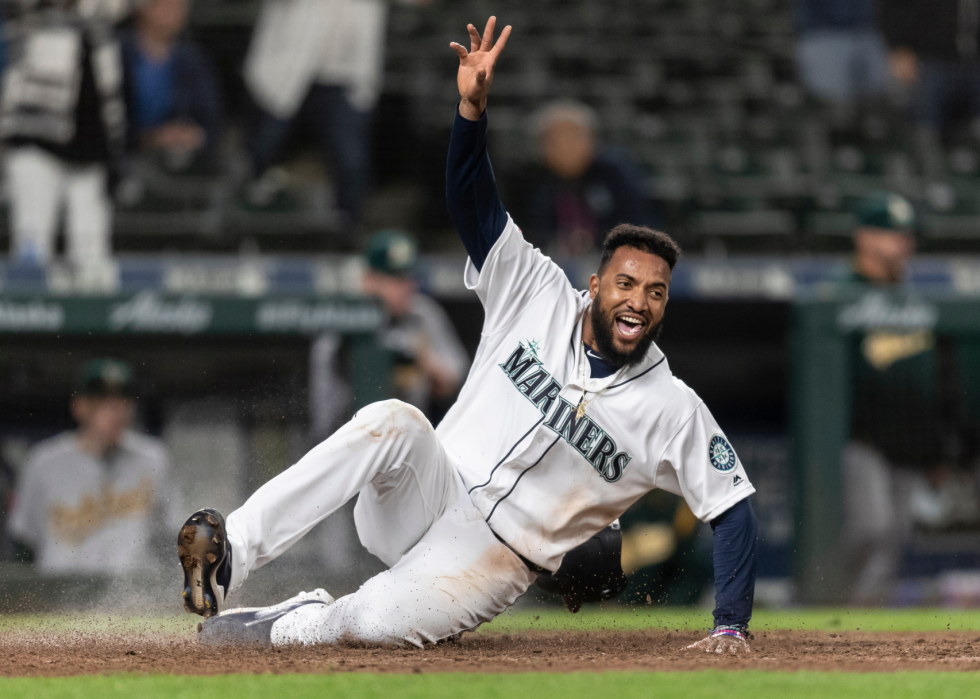
Seattle Mariners
Seattle fans have a connection to the sea, and Mariners was chosen from over 600 entries in a name-that-team competition. After the Seattle Pilots bolted for Milwaukee after one season in 1969, Seattle waited eight years for a 1977 expansion to join the league.
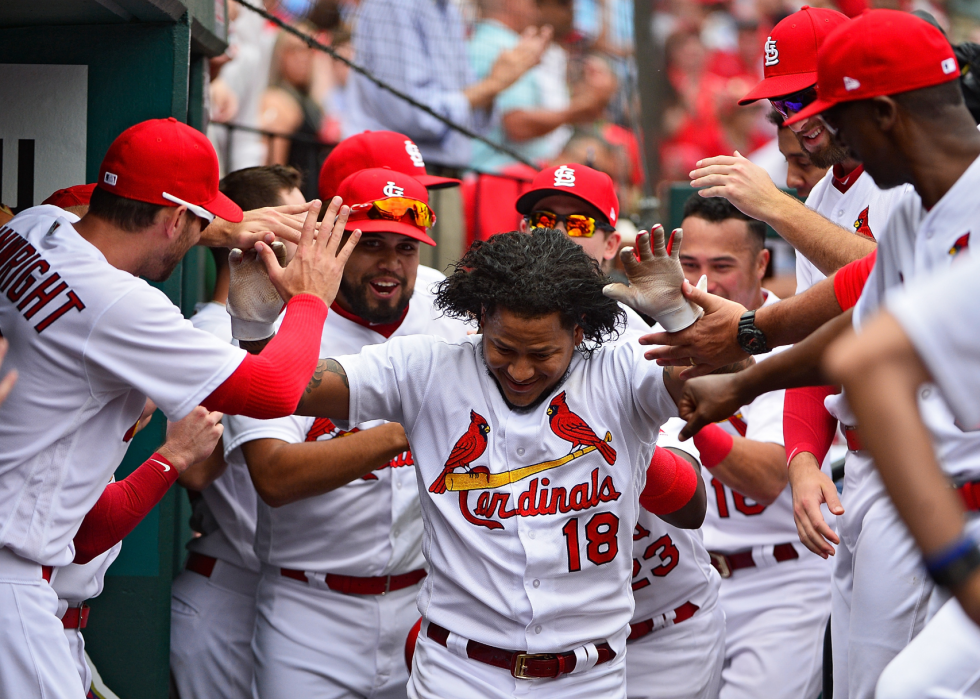
St. Louis Cardinals
The St. Louis Cardinals got their start as the St. Louis Brown Stockings for one season in 1882, before shortening it to the Browns from 1883–99, playing as an AA professional team. The franchise used the name Perfectos for a single season before becoming the Cardinals in 1900, after a reporter for the St. Louis Republic started using the name.

Tampa Bay Rays
Tampa Bay was awarded an expansion franchise in 1995 along with Arizona and began play as the Devil Rays in 1998. The name was a reference to the manta rays that populate the ocean. Under new ownership in 2008, the team dropped the word Devil and became simply the Rays, signifying the warmth of the sun in the Sunshine State, although a manta ray still adorns the team's sleeves.
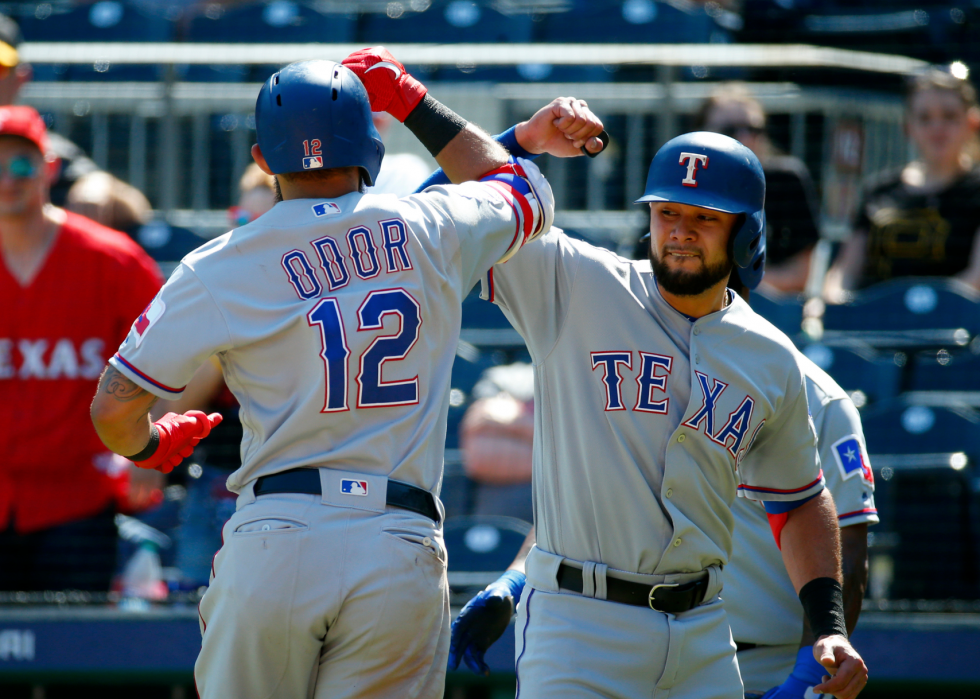
Texas Rangers
The Texas Rangers got their start as the Washington Senators after the nation's capital was awarded an expansion franchise in 1961. Like two previous incarnations of the Washington Senators, this one left as well, heading to Arlington, Texas in 1972. The name Rangers was chosen by owner Robert Short as an homage to the famous Texas law enforcement group of the same name.

Toronto Blue Jays
The only team remaining in Canada got its start as part of an expansion in 1977. The name Blue Jays was an easy choice from a name-that-team contest, as it was both a reference to the bird and fit in perfectly with owners' signature beer, Labatt Blue.
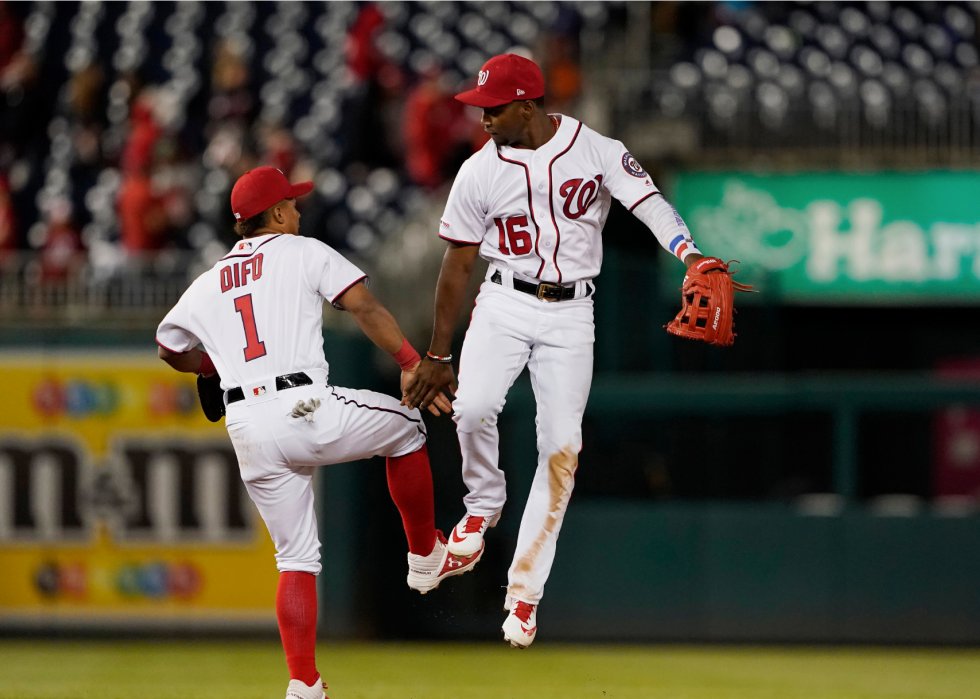
Washington Nationals
The Nationals began play in 1969 as the Montreal Expos, before relocating to Washington D.C. for the start of the 2005 season. The Nationals are the eighth major league franchise in the city's history, ending a 33-year gap when the Washington Senators relocated to Texas. The Nationals won out over Senators as the team's name, as fans feared calling them the Senators, since the previous two Washington Senators teams had relocated.



